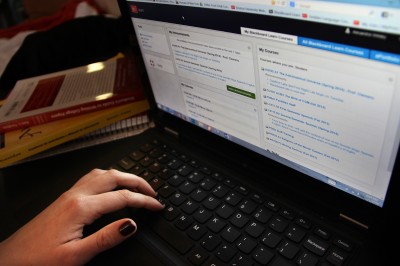
With the U.S. Department of Education’s ongoing investigation of Boston University for mishandling sexual assault complaints, BU administrators officially released an online education program about sexual assault Friday for all faculty and staff to complete in a timely manner, with student participation scheduled for the start of the spring semester.
The online program, which some faculty and staff members tested earlier this semester, aims to better equip members of the BU community with the resources they need to adequately assist students in reporting sexual assault, said Dean of Students Kenneth Elmore, co-chair of the sexual misconduct task force.
“We want to make sure the faculty and staff are informed and know what their responsibilities are as they relate to sexual misconduct, rape and violence,” he said. “These are people around campus who receive these reports, and we want to make sure they’ve got the information they need. It’s to inform so people know exactly what they should be doing.”
The training program defines sexual assault and provides information about reporting incidents, confidentiality and responsibility, Elmore said. It is run through the Blackboard website and takes about 30 minutes to complete, and includes quizzes, external links and reference information for outside resources.
“We wouldn’t put it out there if we didn’t think it would be important,” he said. “I certainly hope the faculty and staff will use the information they receive as a reference point to revisit with frequency.”
Elmore said a similar, optional student version of the training is expected to take place in the spring semester, providing similar information to help them deal with the trauma associated with misconduct.
College campuses such as BU must comply with requirements from the Jeanne Clery Disclosure of Campus Security Policy and Campus Statistics Act to participate in federal student financial aid programs, according to Title IV of the Higher Education Act of 1965.
Peter Fiedler, vice president for administrative services, works alongside Elmore as co-chair of the sexual misconduct task force. In implementing the training program, Fiedler emphasized the importance of awareness and full understanding.
“We’re trying to bring more awareness to the problem,” he said. “Sexual assault is the most underreported crime, and we want people to understand their responsibilities in these situations. We want to avoid victim blaming and false accusations. It’s very complicated stuff. We must not only protect our students but also our faculty and staff.”
Jessica Klein, health and resources coordinator at BU’s Center for Gender, Sexuality and Activism, said she hopes the training will allow staff to better accommodate students facing these issues.
“One of the main things that I’m hoping will come out of this is that if a student decides to disclose something to a professor that they feel close to, the faculty or staff member will have better training to handle it,” said Klein, a junior in the College of Arts and Sciences. “It won’t be something that they will feel unprepared for, and [professors] can take better steps to getting their students the help that they need.”
Several students said they recognized faculty efforts to increase awareness and education about sexual misconduct, especially due to the prevalence of the issue on college campuses.
Tori Cox, a freshman in CAS, said the sexual misconduct training is helpful, but only if it takes into account different types of sexual misconduct and how they affect the student body.
“One thing I think that needs to be kept in mind is that when you’re thinking about sexual harassment, you shouldn’t keep it to one gender or sexuality,” she said. “It’s something that affects everybody in some way, shape or form. In developing ideas, you need to look at the student body as a whole, no matter where they’re from or who they are.”
Mojan Moghaddam, a junior in CAS, said she has noticed a stronger prevalence of sexual assault in the United States as opposed to her home country of Iran.
“I’m not from the U.S., but from what I’ve seen, it’s a big issue here,” she said. “Because it’s a free country, people think they can do whatever they want, and they don’t respect the law or anything. It’s important for faculty and students to know these things.”
Jay Patruno, a freshman in Sargent College of Health and Rehabilitation Sciences, said BU’s efforts to remedy sexual misconduct may not fully resolve the issue, but takes an important step in improving student safety.
“It’s one of those things that no matter how much you try to help it, you’re never going to get a 100 percent resolution,” he said. “I feel like BU and most places are doing something to stop something that’s so disgusting.”




